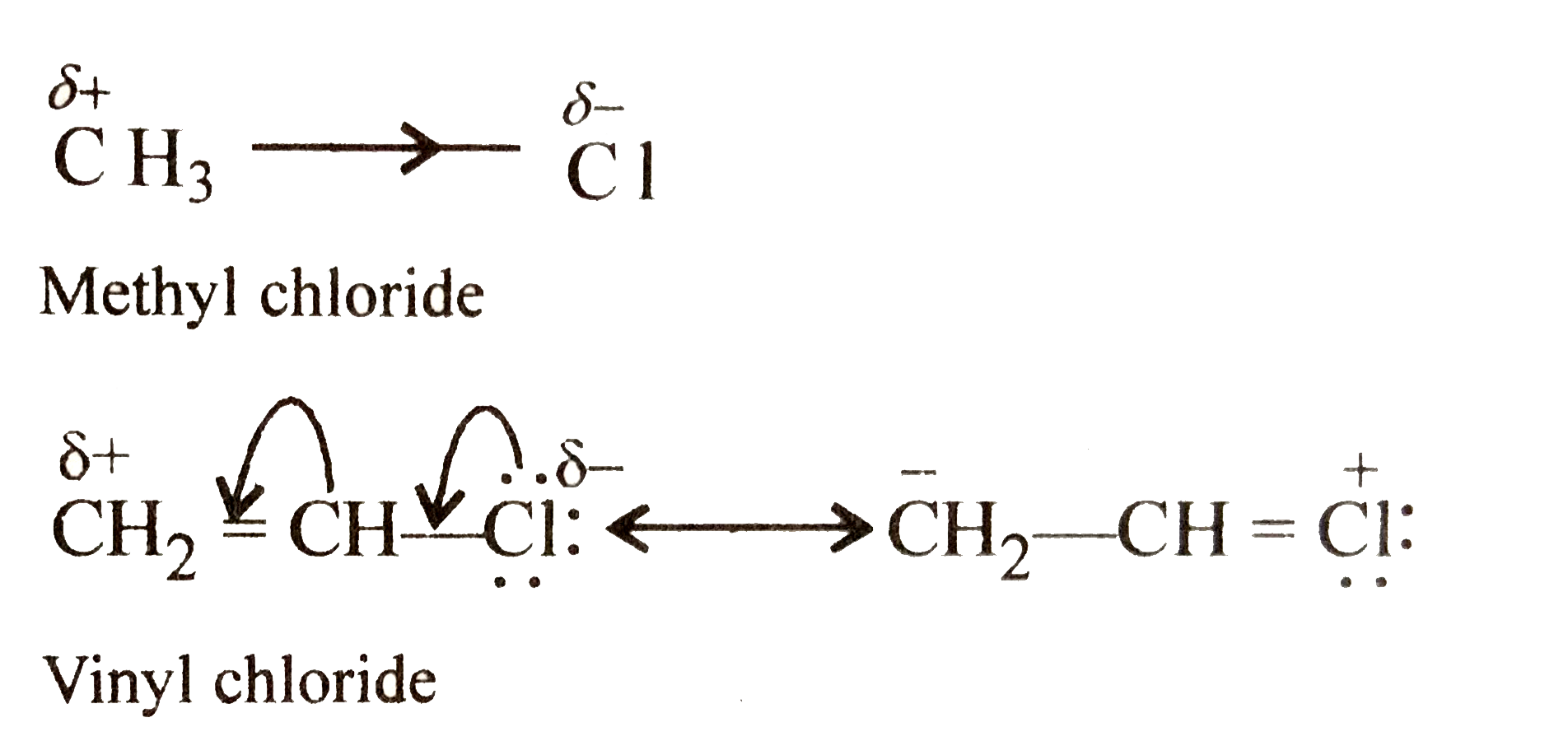The dipole moment of vinyl chloride is lower than that of methyl chloride. This is due to
Resonance effect
Inductive effect
Electromeric effect
Hyperconjugation effect
The correct Answer is:A

Due to resonance vinyl chloride has lesser dipole moment.
Topper's Solved these Questions
- BASIC PRINCIPLES OF ORGANIC CHEMISTRYBook:DINESH PUBLICATIONChapter:BASIC PRINCIPLES OF ORGANIC CHEMISTRYExercise:REVISION QUESTIONS FROM COMPETITIVE EXAMS.
Explore 192 Videos
- BASIC PRINCIPLES OF ORGANIC CHEMISTRYBook:DINESH PUBLICATIONChapter:BASIC PRINCIPLES OF ORGANIC CHEMISTRYExercise:SELECTED STRAIGHT OBJECTIVE TYPE MCQS
Explore 64 Videos
- ALKALI EARTH METALSBook:DINESH PUBLICATIONChapter:ALKALI EARTH METALSExercise:Unit test-12
Explore 5 Videos
- BIOMOLECULESBook:DINESH PUBLICATIONChapter:BIOMOLECULESExercise:MATRIX - MATCH TYPE
Explore 8 Videos
Similar Questions
Knowledge Check
Dipole moment of diiethyl ether is lower than that of
ACH3OHBC6H5OHCCH3−IDCH3CHO
Give reasons :
The dipole moment of chlorobenzene is lower than that of cyclohexyl chloride.
View SolutionExplain why
(i) the dipole moment of chlorobenzene is lower than that of cyclohexyl chloride?
(ii) alkyl halides, though polar, are immiscible with water?
(iii) Grignard reagents should be prepared under anhydrous conditions?
View SolutionExplain why
(i) the dipole moment of chlorobenzene is lower than that of cyclohexyl chloride?
(ii) alkyl halides, though polar, are immiscible with water?
(iii) Grignard reagents should be prepared under anhydrous conditions?
View SolutionExplain the following :
(a) The dipole moment of chlorobenzene is lower than that of cyclohexyl chloride.
(b) Alkyl halides, though polar, are immiscible with water.
(c) Grignard reagents should be prepared under anhydrous condition.
View SolutionGive reasons:
(i) C–Cl bond length in chlorobenzene is shorter than C–Cl bond in CH3Cl.
(ii) The dipole moment of chlorobenzene is lower than that of cyclohexyl chloride
(iii) SN1 reactions are accompained by racemization in optically active alkyl halides
View SolutionExplain why
(a) the dipole moment of chlorobenzene is lower than that of cyclohexyl chloride ?
(b) alkyl halides, though polar, are immiscible with water ?
(c) vinyl chloride is unreactive in nucleophilic substitution reactions ?
(d) neopentyl bromide undergoes nucleophilic substitution reactions very slowly ?
(e) 3-bromocyclohexane is more reactive than 4- bromocyclohexane in hydrolysis with aqueous NaOH ? (f) tert butyl chloride reacts with aqueous sodium hydroxide by SN1 mechanism while n-butyl chloride reacts by SN2 mechanism.
(g) Grignard reagents should be prepared under anhydrous conditions ?
View SolutionExplain why the dipole moment of chlorobenzene is lower than that of cyclohexyl chloride.
View Solution

